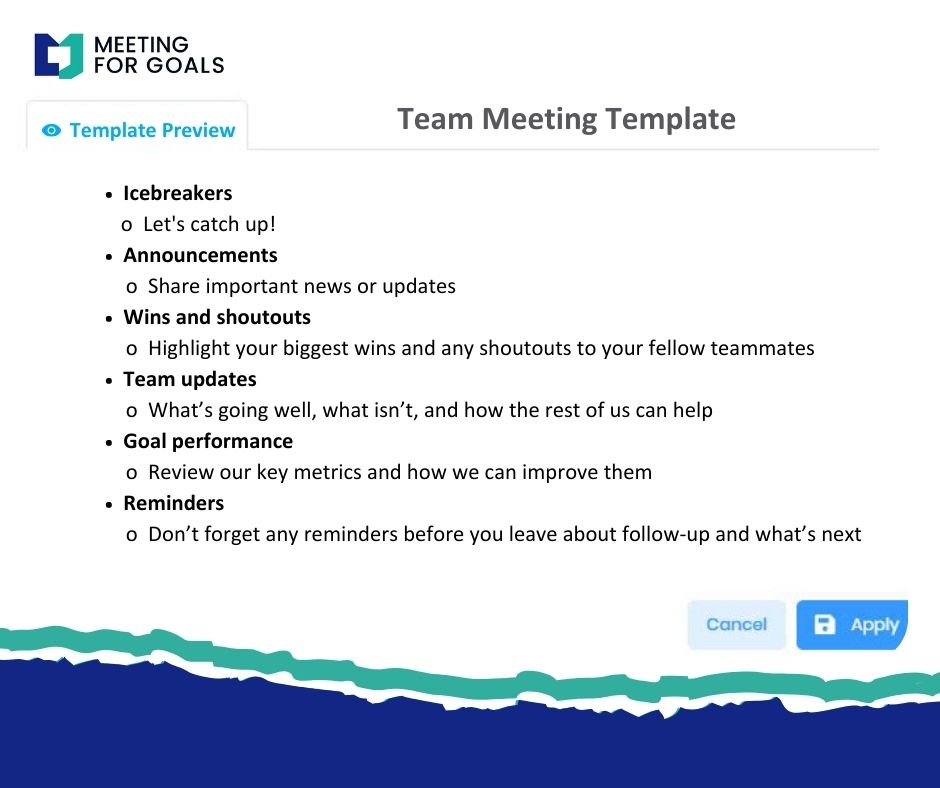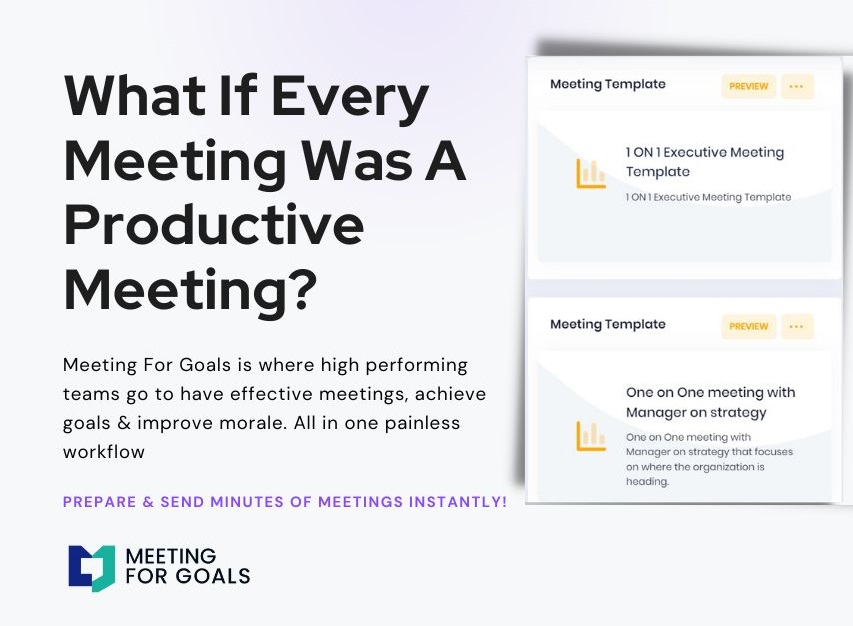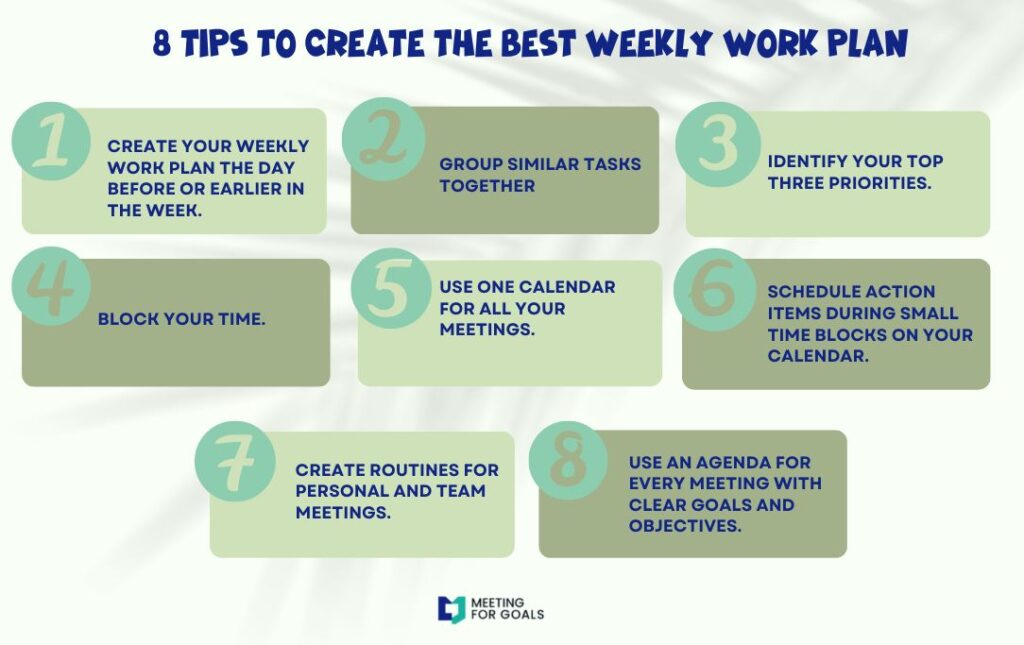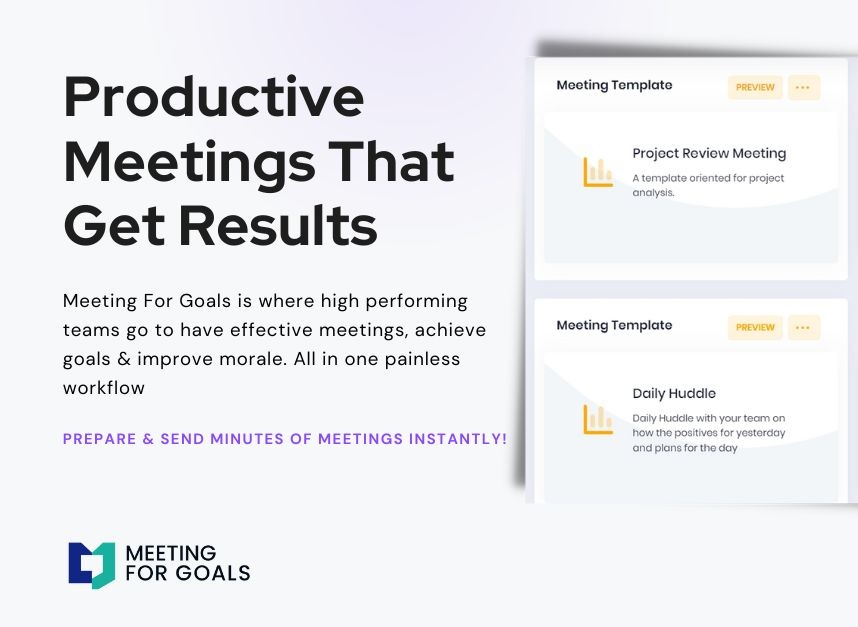How to Run Effective Team Meetings That Drive Results
In today’s fast-paced corporate environment, effective team meetings are no longer a luxury—they’re a necessity. For high-performing teams, meetings are the engine that drives alignment, accountability, and action. Yet, many companies still struggle with unproductive, time-consuming discussions that derail progress and drain morale. That’s where Meeting For Goals steps in.
Designed specifically for teams of 40–70 employees, our meeting management software transforms how leadership teams plan, conduct, and follow up on meetings. In this blog, we’ll explore proven strategies for running effective team meetings, all while showcasing how Meeting For Goals can help your organization save time, boost engagement, and stay aligned with strategic objectives.
Ready to take your meetings from chaotic to coordinated? Sign up now at https://app.meetingforgoals.com/TenantRegistration/Register and see the difference.
Introduction
Meetings can be a double-edged sword. On one hand, they’re essential for collaboration, decision-making, and keeping teams aligned. On the other, they often turn into time-wasting sessions with no clear purpose or outcome.
The truth? Ineffective meetings cost companies thousands of hours—and dollars—every year.
At Meeting For Goals, we believe meetings should be purposeful, focused, and outcome-driven. Whether you’re a Director, VP, or C-suite executive, optimizing your meeting workflow can significantly boost your team’s productivity and morale.
In this guide, we’ll walk through six key components of effective team meetings:
- Why meeting management matters
- How to set clear objectives
- The power of a focused agenda
- How to drive engagement and accountability
- Time-saving strategies for better meetings
- A roadmap to transform your meetings for good
Let’s dive in.
2 Minute Video
Watch a 2 minute demo of our meeting management software in action
Section 1: Why Meeting Management Matters
Meeting management is more than just sending calendar invites. It’s the art and science of planning, executing, and following up on meetings so they’re efficient and goal-focused.
Why It’s a Big Deal
Executives spend an average of 23 hours a week in meetings. Shockingly, 67% of those meetings are considered unproductive, according to a study by Harvard Business Review.
That’s a lot of wasted time. Poorly managed meetings lead to confusion, disengagement, and missed deadlines. For mid-sized teams juggling multiple priorities, this lack of clarity can stall progress and hurt morale.
But when meetings are well-managed, teams stay aligned, decisions get made, and action happens.
Common Pitfalls of Poor Meeting Management
- No clear goals or purpose
- Vague or missing agendas
- Meetings that run overtime
- No follow-up or accountability
These issues don’t just waste time—they create frustration and erode trust within your team.
How Meeting For Goals Fixes This
Meeting For Goals eliminates these common problems with an all-in-one platform. You can plan meetings with clear objectives, assign roles, and ensure follow-through. Built-in tools for agenda creation, time tracking, and accountability help you run meetings that actually move the needle.
Want to skip the guesswork? Check out our free meeting templates at https://meetingforgoals.com/meeting_templates to get started fast.
Adding an Agenda
How to add an agenda instantly on Meeting For Goals
Section 2: Setting Clear Objectives
Before you schedule a meeting, ask yourself: What’s the goal?
Setting clear objectives is the foundation of a productive meeting. Without it, your team could spend an hour talking in circles.
Why Objectives Matter
Objectives give your meeting direction. They help everyone understand what needs to be accomplished and why the meeting is happening.
This is especially important for leadership teams managing cross-functional projects. When everyone is aligned on the goal, meetings become faster, more focused, and more effective.
Use SMART Goals
A great way to set effective objectives is by using the SMART framework:
- Specific: Define exactly what you want to achieve
- Measurable: Know how you’ll track success
- Achievable: Keep it realistic for the time you have
- Relevant: Make sure it ties into broader company goals
- Time-bound: Set a deadline or timeframe
For example, instead of saying “Talk about Q3 marketing,” try: “Finalize Q3 marketing plan, including campaign dates and budget, in 45 minutes.”
How Meeting For Goals Helps
Our platform makes it easy to set and share meeting objectives. You can link each meeting to specific company goals and make those objectives visible to all attendees before the meeting even starts.
After the meeting, you’ll get a summary showing whether objectives were met—helping your team improve over time.
Section 3: Designing a Focused Agenda
Think of your agenda as your meeting’s roadmap. Without one, it’s easy to get lost.
A focused agenda keeps discussions on track, ensures important topics are covered, and helps you stick to your timeframe.
Why Agendas Matter
A strong agenda sets expectations. It tells attendees what will be discussed, who’s leading each topic, and how much time is allocated.
This structure is especially useful for busy executives who need to make the most of their time.
Key Elements of a Great Agenda
- Clear meeting objective
- List of discussion topics
- Time allocation for each item
- Assigned roles (facilitator, note-taker, etc.)
- Pre-meeting materials or preparation
How Meeting For Goals Makes It Easy
Our drag-and-drop agenda builder is intuitive and fast. You can assign time slots, tag participants, and share the agenda ahead of time.
During the meeting, our real-time tracking shows how you’re progressing—so you can adjust on the fly and avoid going over time.
Want to see how it works? Visit https://meetingforgoals.com for a closer look.
Section 4: Fostering Engagement and Accountability
Great meetings aren’t lectures—they’re conversations.
Getting everyone involved and making sure follow-ups happen is key to turning meetings into action.
Why Engagement Is Crucial
Engaged participants contribute ideas, solve problems, and take ownership. Disengaged team members? They’re more likely to multitask or check out.
For high-performing teams, engagement isn’t optional—it’s essential.
How to Boost Engagement
- Assign roles like facilitator, timekeeper, or note-taker
- Ask open-ended questions to spark discussion
- Use visuals like charts or dashboards to keep it interesting
- Rotate who leads the meeting to keep things fresh
The Role of Accountability
A meeting without follow-up is like a to-do list no one checks.
Assigning action items during the meeting—and tracking them afterward—ensures that decisions turn into results. This builds trust and keeps your team moving forward.
How Meeting For Goals Supports Engagement
Our platform makes it easy to assign tasks during the meeting, set deadlines, and track progress. Tasks are automatically sent to assignees, and reminders help ensure nothing falls through the cracks.
This creates a culture of accountability and follow-through.
Section 5: Time Management Strategies
Time is your team’s most valuable resource. Don’t waste it.
Poor time management leads to rushed decisions, missed topics, and frustrated teams. On the flip side, well-timed meetings are efficient, energizing, and effective.
Why Time Management Matters
When meetings run over, it disrupts everyone’s day. It also signals that their time isn’t respected.
Good time management shows professionalism and helps your team stay focused and productive.
Time-Saving Tips That Work
- Set time limits for each agenda item
- Assign a timekeeper to keep things moving
- Start and end the meeting on time
- Leave 5 minutes at the end for wrap-up and questions
- Don’t overload the agenda—focus on 2-3 key topics
How Meeting For Goals Keeps You On Track
Our built-in timers and real-time agenda tracking help you stay on schedule. Facilitators get alerts when a topic is running long, so you can pivot or table discussions if needed.
This helps your team reclaim hours every week—and stay laser-focused on what matters.
Want a deeper dive into time-saving techniques? This article from Forbes shares additional insights on how to run meetings that don’t waste time: https://www.forbes.com/sites/forbescoachescouncil/2020/06/25/15-ways-to-run-efficient-meetings/
Section 6: A Roadmap to Transform Your Meetings
Transforming your meetings doesn’t require a complete overhaul—it just takes a few smart changes.
Here’s a simple roadmap to get started:
- Start with clear objectives using the SMART framework
- Build a focused agenda that aligns with your goals
- Assign roles and encourage participation
- Use tools to track time and progress
- Follow up with action items and deadlines
- Evaluate what worked and what didn’t—then improve
It’s a cycle of continuous improvement. And with the right tools, it’s easier than ever.
Meeting For Goals: Your Partner in Productive Meetings
Our platform was built for teams like yours—mid-sized, fast-moving, and focused on results. From planning to follow-up, we help you run meetings that actually matter.
Want to see how it works in real life? Explore our free meeting templates here: https://meetingforgoals.com/meeting_templates
Conclusion
Effective meetings aren’t just about talking—they’re about doing.
When your team has the right structure, tools, and mindset, meetings become a powerful driver of performance. You’ll save time, boost morale, and get more done.
Meeting For Goals is here to help you every step of the way.
From setting clear objectives to tracking follow-ups, our all-in-one software makes meetings simple, strategic, and successful.
Ready to transform your meetings and reach your goals faster? Sign up now at https://app.meetingforgoals.com/TenantRegistration/Register and start your journey toward better meetings today.
For more tips, tools, and templates, visit https://meetingforgoals.com and take the first step toward the productive meetings your team deserves.
And for a broader perspective on the cost of unproductive meetings, check out this insightful piece from the Harvard Business Review: https://hbr.org/2017/07/stop-the-meeting-madness
Your time is valuable—start making every meeting count.




